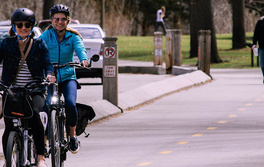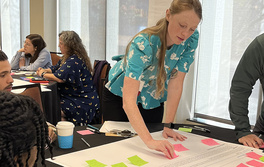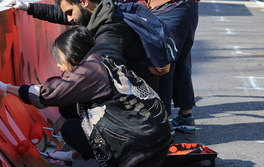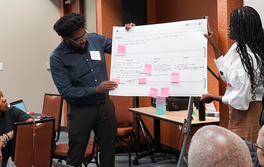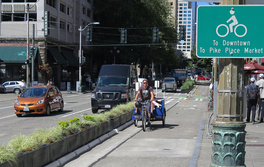
STATEMENT: Congress Must Tie Federal Infrastructure Investments to Climate, Racial Justice, Inclusive Economic Recovery Through Transportation Performance Measures
The following is a statement from Harriet Tregoning, director of NUMO, the New Urban Mobility alliance, on the Infrastructure Investment and Jobs Act.
NUMO welcomes the efforts of the United States Congress and the Biden-Harris administration to advance infrastructure investments to meet the needs of the American people. The Infrastructure Investment and Jobs Act represents an historic investment in our transportation system, but whether the bill will set the U.S. on the path to transportation decarbonization, racial justice, a comprehensive and inclusive economic recovery and universal access to mobility will depend on how these investments are allocated.
Now is the time for the federal government to establish transportation performance measures to ensure that the vision laid out in the American Jobs Plan to address the climate emergency, racial justice and access to opportunity is enshrined in how this funding is distributed.
As Congress works to finalize surface transportation reauthorization, NUMO strongly encourages the Senate to consider the following key policies from the House’s transformative INVEST in America Act, and to conference the bills. These policies are essential to building an equitable, sustainable transportation system:
- Establishing two new performance management measures: one for carbon reduction and one for multimodal access, and ensuring these targets are meaningful and tied to outcomes. Our transportation system must prioritize sustainably connecting people to opportunities and services. Access for people, therefore, must be the goal, not just moving vehicles more quickly. Using access to destinations and vehicle-miles-traveled as the measures of success for our transportation system will result in more equitable and sustainable access for all.
- Adopting a fix-it-first, fix-it-right approach to roads and bridges that prioritizes repair and modernization of existing infrastructure. This approach is a win-win. Committing to addressing our $435-billion backlog of maintenance and safety upgrades over creating new roads more effectively creates jobs, while giving us the opportunity to revitalize our woefully out-of-date infrastructure.
- Expanding local control to give cities and local governments greater authority over the design and selection of transportation projects within their boundaries, as well as additional opportunities to directly receive federal funds. Currently, only states are eligible for the majority of federal transportation funding, and those funds are mostly managed by state Departments of Transportation. The result is the proliferation of projects that often run counter to city goals. Making cities and local governments directly eligible for funding will allow them to engage their communities in building transportation systems that respond to their needs and work toward municipal and local goals.
We also recommend Congress and the administration undertake the following:
- Amplify the federal investment through leverage from state and local funds. State and local capital budgets are roughly 2% of the nation’s gross domestic product; aligned co-investments have the potential to magnify the impact of these substantial federal infrastructure investments.
- Take action to ensure people will not be displaced from those neighborhoods that will be positively impacted by transportation investments intended to increase economic mobility and access to opportunity.
Without these actions, the Senate will fail to realize the opportunity to galvanize a comprehensive and inclusive economic recovery and universal access to mobility in ways that also decarbonize transportation and help achieve racial justice.
NUMO looks forward to working with the Biden-Harris administration and Congress to make sure that the ambitions of the American Jobs Plan are fully realized.
Please direct media inquiries to Madlyn McAuliffe at madlyn@numo.global.
NUMO, the New Urban Mobility alliance, is a global organization that channels tech-based disruptions in urban transport to create joyful cities where sustainable and just mobility is the new normal. Founded in 2019 as an outgrowth of the Shared Mobility Principles for Livable Cities, NUMO convenes diverse allies and leverages the momentum of significant revolutions in mobility to target urban issues — including equity, sustainability, accessibility and labor — impacted by the shifting transportation landscape. NUMO is hosted by WRI Ross Center for Sustainable Cities.
Header image: Steve Baker / Flickr
